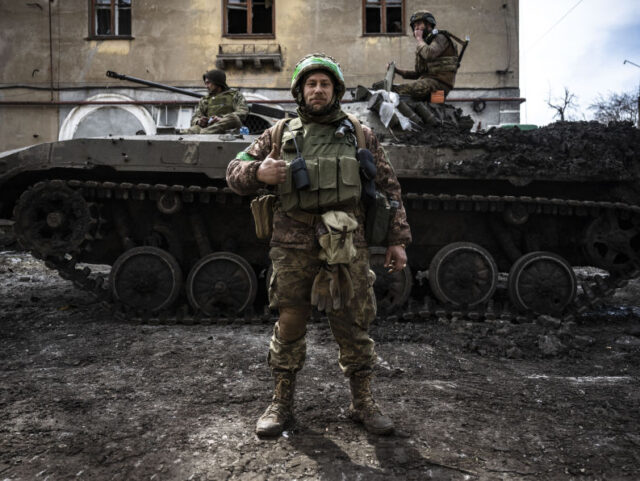A rare moment of agreement between Russian and Ukrainian state media organisations emerged over the authenticity of a cache of allegedly leaked U.S. intelligence documents.
Alleged U.S. Joint Staff briefing documents claiming to discuss casualty numbers and logistics including the provision of military materiel to Ukraine were published on Russian social media on Friday, as reported by Breitbart News, representing a major breach of U.S. security by Russian actors if true. Yet the 100-plus documents, which seemed to suggest that Ukraine was fielding fewer troops than thought and had sustained considerably more casualties than Russia, were instantly called into question, and nowhere more stridently than by Ukraine itself.
Russia’s intelligence agents are now so ineffective, said President Zelensky advisor Mykhailo Podolyak, they have been reduced to “photoshop & ‘virtual fake leaks’,” which he insisted is what the documents were. These papers were an effort to “disrupt the Ukrainian counteroffensive” but would not be effective, he said. Publishing these papers was a “bluff” because it would be counterproductive for a real intelligence officer to burn a source by making a potentially rich seam of information exposed to discovery by going public.
Making the point explicitly, the Ukrainian state news service Ukrinform explained: “The documents published by Russian sources may have been partially doctored to cover up the real situation of Russia’s losses and exaggerate Ukrainian casualties.”
The Ukrainians aren’t the only people who suspect the alleged Pentagon leaks might be fakes, though. Pro-Russian front organisation organiser Vladimir Rogov warned, in comments elevated by Russian state media group TASS, that the documents could be forgeries intended to lull Russian forces into a sense of false security. He said: “I think this is a classical disinformation operation, being conducted to mislead us, to make us think [the Ukrainian counter-offensive] is not ready yet and we can relax… Part of what is said there may be true, but as far as the timing is concerned, it’s definitely not so.”
The idea of a Ukrainian spring counteroffensive after a winter of static, almost trench-warfare-like combat has been widely discussed in Western government and media circles, but the exact timing and form of this remain unclear. To Rogov, these leaked documents are intended to keep the Russians guessing. He continued: “In my opinion, it is an attempt to make us think that an offensive may be possible only after some time, and not within the next few days. On the other hand, the situation on the frontline points to the opposite: equipment continues to arrive, equipment is ready, and enough militants have been trained… this equipment will not remain idle, but will go on the offensive.”
The United States has said little officially about the supposed leak but the tone of a New York Times article about the documents Firdya was dead serious, referring to “a rush to find the source of the leaks” that could be “hugely damaging”, a “nightmare”, and which could “hinder Ukrainian military planning”. The report cites a former Pentagon official who said it appeared the leak was “done by someone that wished to damage the Ukraine, U.S., and NATO efforts”.
It also spoke to questions over the authenticity of what had been released, however, noting how some pages of what appeared to be an authentic document had been modified to rebalance casualty estimates in Russia’s favour.
The Pentagon has launched an investigation with the Justice Department. Pentagon spokesman Sabrina Singh said: “We are aware of the reports of social media posts, and the department is reviewing the matter”. A Justice Department spokesman said: “We have been in communication with the Department of Defense related to this matter and have begun an investigation. We decline further comment.”

COMMENTS
Please let us know if you're having issues with commenting.